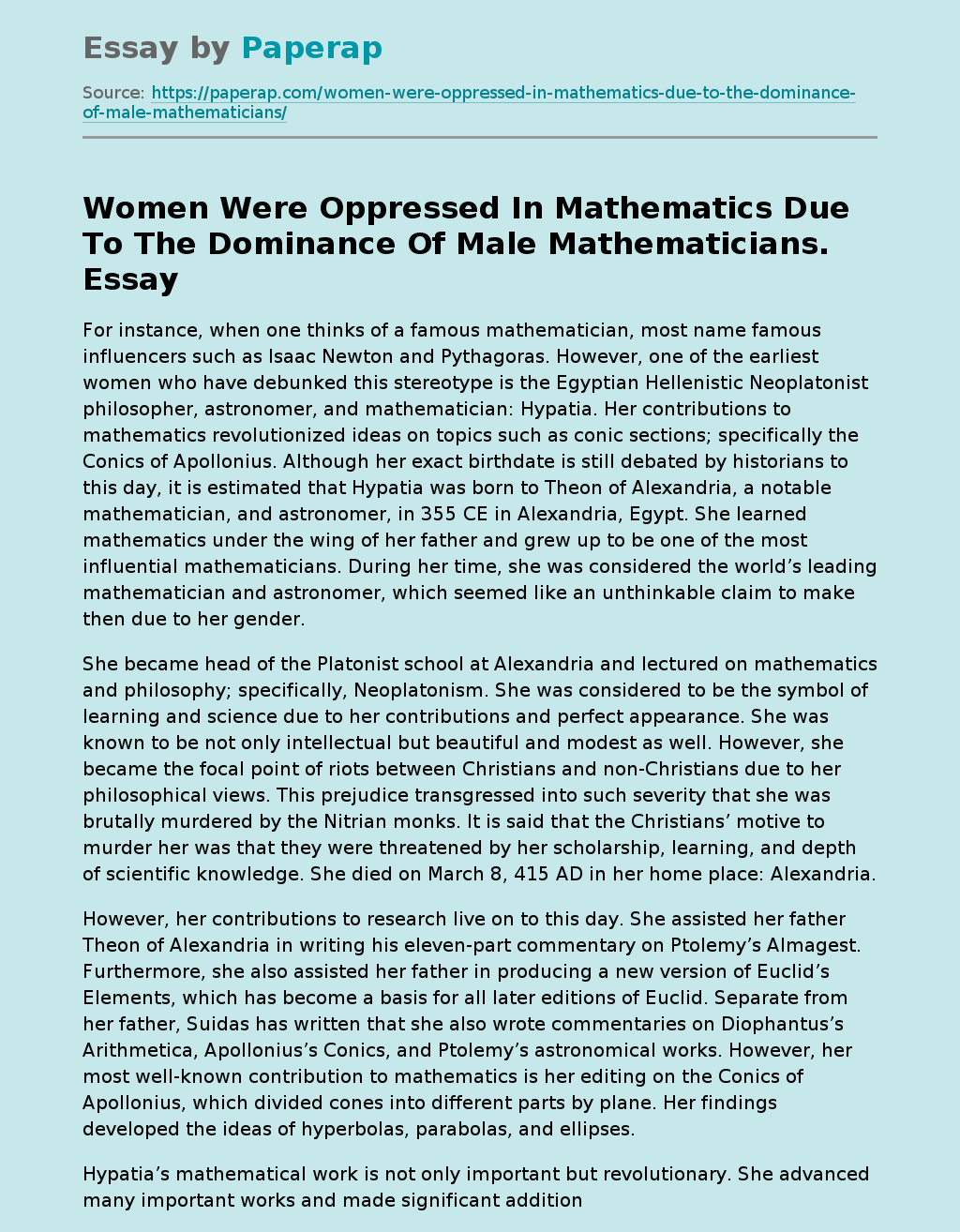Women Were Oppressed In Mathematics Due To The Dominance Of Male Mathematicians.
For instance, when one thinks of a famous mathematician, most name famous influencers such as Isaac Newton and Pythagoras. However, one of the earliest women who have debunked this stereotype is the Egyptian Hellenistic Neoplatonist philosopher, astronomer, and mathematician: Hypatia. Her contributions to mathematics revolutionized ideas on topics such as conic sections; specifically the Conics of Apollonius. Although her exact birthdate is still debated by historians to this day, it is estimated that Hypatia was born to Theon of Alexandria, a notable mathematician, and astronomer, in 355 CE in Alexandria, Egypt.
She learned mathematics under the wing of her father and grew up to be one of the most influential mathematicians. During her time, she was considered the world’s leading mathematician and astronomer, which seemed like an unthinkable claim to make then due to her gender.
She became head of the Platonist school at Alexandria and lectured on mathematics and philosophy; specifically, Neoplatonism. She was considered to be the symbol of learning and science due to her contributions and perfect appearance.
She was known to be not only intellectual but beautiful and modest as well. However, she became the focal point of riots between Christians and non-Christians due to her philosophical views. This prejudice transgressed into such severity that she was brutally murdered by the Nitrian monks. It is said that the Christians’ motive to murder her was that they were threatened by her scholarship, learning, and depth of scientific knowledge. She died on March 8, 415 AD in her home place: Alexandria.
However, her contributions to research live on to this day. She assisted her father Theon of Alexandria in writing his eleven-part commentary on Ptolemy’s Almagest. Furthermore, she also assisted her father in producing a new version of Euclid’s Elements, which has become a basis for all later editions of Euclid. Separate from her father, Suidas has written that she also wrote commentaries on Diophantus’s Arithmetica, Apollonius’s Conics, and Ptolemy’s astronomical works. However, her most well-known contribution to mathematics is her editing on the Conics of Apollonius, which divided cones into different parts by plane. Her findings developed the ideas of hyperbolas, parabolas, and ellipses.
Hypatia’s mathematical work is not only important but revolutionary. She advanced many important works and made significant additions to them. Her most influential contribution, her edits on the Conics of Apollonius, made the concepts easier to understand, allowing the work to survive through many centuries. Aside from her mathematical contributions, her work is important because of her gender. During her time, women were severely oppressed and overshadowed by men in all fields. However, she challenged the narrow-minded public and proved to society that women were also capable of contributing to topics such as math and astronomy. She is known to be the “first notable woman mathematician” and her contributions are considered impactful for obvious reasons. Although we did not go over conic sections in Pre-Calculus Honors so far, we learned about it in Geometry and Algebra 2. In geometry, a conic section is the curve created when one cuts through a cone with a flat plane. The first conic section is the circle, which is the cross-section of a cone as cut to be a plane, perpendicular to the axis of that cone.
When you tilt the plane so that it still cuts across one nappe but not the other, it creates an ellipse rather than a circle. These are some of the edits that Hypatia made to Apollonius’ research. When you do a quick Google search on Mathematicians, there is a long list of male mathematicians presented to you. However, when you scroll through it for a few seconds, you find Hypatia in the forest of male names. Although females are still considered to be segregated in the mathematical and science field, Hypatia faced more severe prejudice thousands of years ago. Sadly, much of her research is lost, and historians are still working to recover this amazing mathematicians’ work. Although Hypatia lived a short life and died a tragic death, her impact is found not only in her work but in society as well.
Women Were Oppressed In Mathematics Due To The Dominance Of Male Mathematicians.. (2021, Dec 04). Retrieved from https://paperap.com/women-were-oppressed-in-mathematics-due-to-the-dominance-of-male-mathematicians/

